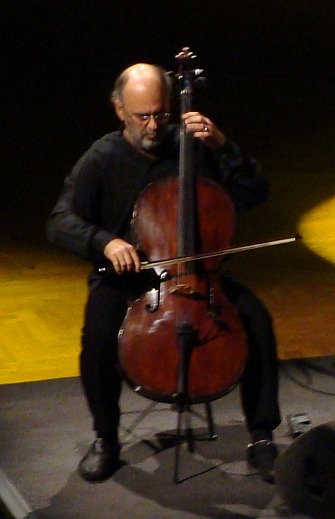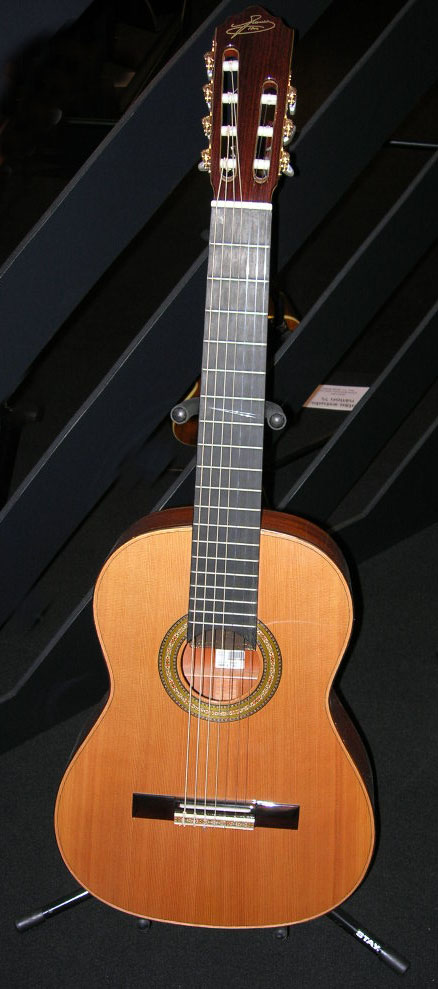|
Raphael Rabello
Rafael Baptista Rabello (October 31, 1962 – April 27, 1995) was a virtuoso Brazilian guitarist and composer. During the 1980s and 1990s, he was considered one of the best acoustic guitar players in the world and played with many famous artists, such as Tom Jobim, Ney Matogrosso, Paulo Moura, and Paco de Lucia. Biography Early years Raphael Rabello was born in Petrópolis, Rio de Janeiro, Brazil. He was the youngest child of his family, which included many musicians. His sister Luciana was a well-known cavaquinho player and his other sister, Amélia, became a singer. His first guitar teacher was an older brother, Ruy Fabiano, when Raphael Rabello was seven years old. However, the biggest influence on Rabello starting his music studies was his grandfather, José de Queiroz Baptista, who was a choro guitar player. He studied music theory with Maria Alice Salles, who also taught his brothers and sisters. In the 1970s, he took guitar lessons with Jaime Florence, the famous Meira ... [...More Info...] [...Related Items...] OR: [Wikipedia] [Google] [Baidu] |
Petrópolis
Petrópolis (; ), also known as The Imperial City, is a Municipalities of Brazil, municipality in the Southeast Region, Brazil, Southeast Region of Brazil. It is located in the state of Rio de Janeiro (state), Rio de Janeiro, northeast of the city of Rio de Janeiro. According to the 2010 National Brazilian Census, Petrópolis municipality had 295,917 inhabitants that year, up from 286,537 inhabitants at the last census. Besides being the largest and most populous city in the :pt:Microrregião Serrana, Fluminense Mountain Region, the city also has the largest GDP and HDI in the region. The town's name ("city of Peter") honors Pedro II of Brazil, Pedro II, the last List of monarchs of Brazil, Emperor of Brazil, who is entombed there at the Cathedral of Petrópolis, Cathedral of Saint Peter of Alcantara. The city was the summer residence of the List of monarchs of Brazil, Brazilian Emperors and aristocrats in the 19th century, and was the official capital of the Rio de Janeiro (stat ... [...More Info...] [...Related Items...] OR: [Wikipedia] [Google] [Baidu] |
Luciana Rabello
Luciana may refer to: * Luciana (given name), a Latin feminine given name * Luciana (singer), British pop singer * Luciana, Ciudad Real Luciana is a small village and municipality in the province of Ciudad Real (Spain), near the confluence of the Bullaque and Guadiana The Guadiana River (, also , , ), or Odiana, is an international river defining a long stretch of the Port ..., a small village and municipality in Spain * ''Luciana'' (album), by Juno Reactor {{disambig ... [...More Info...] [...Related Items...] OR: [Wikipedia] [Google] [Baidu] |
Laurindo Almeida
Laurindo Almeida (September 2, 1917 – July 26, 1995) was a Brazilian guitarist and composer in classical, jazz, and Latin music. He and Bud Shank were pioneers in the creation of bossa nova. Almeida was the first guitarist to receive Grammy Awards for both classical and jazz performances. His discography encompasses more than a hundred recordings over five decades. Background Laurindo Jose de Araujo Almeida Nobrega Neto was born in the village of Prainha, Brazil near Santos in the state of São Paulo. Born into a musical family, Almeida was a self-taught guitarist. During his teenage years, Almeida moved to São Paulo, where he worked as a radio artist, staff arranger and nightclub performer. At the age of 19, he worked his way to Europe playing guitar in a cruise ship orchestra. In Paris, he attended a performance at the Hot Club by Stephane Grappelli and famed guitarist Django Reinhardt, who became a lifelong artistic inspiration. Returning to Brazil, Almeida continu ... [...More Info...] [...Related Items...] OR: [Wikipedia] [Google] [Baidu] |
Jaques Morelenbaum
Jaques Morelenbaum (() born 18 May 1954) is a Brazilian instrumentalist, arranger, conductor, composer and music producer. Morelenbaum was born in Rio de Janeiro, the son of conductor Henrique Morelenbaum and piano teacher Sarah Morelenbaum. His siblings are Lucia Morelenbaum, clarinetist in the Brazilian Symphony Orchestra, and Eduardo Morelenbaum, conductor, arranger and instrumentalist. He is married to singer Paula Morelenbaum. He started his musical career as part of the group A Barca do Sol, and participated in the Nova Banda that performed live with Antonio Carlos Jobim and in recordings that led to a Grammy win for the CD ''Antonio Brasileiro''. As a cellist, he studied music in Brazil and later attended the New England Conservatory of Music. In 1995, with Paula Morelenbaum, Paulo Jobim and Daniel Jobim he created the ''Quarteto Jobim Morelenbaum''. The group has toured Europe several times, including an appearance at the ''Expo'98'' held in Lisbon. They have also tour ... [...More Info...] [...Related Items...] OR: [Wikipedia] [Google] [Baidu] |
Elizeth Cardoso
Elizeth Moreira Cardoso (sometimes listed as Elisete Cardoso) (July 16, 1920 – May 7, 1990), was a singer and actress of great renown in Brazil. Biography Cardoso was born in Rio de Janeiro; her father was a serenader who played guitar, and her mother was an amateur singer. Elizeth began working at an early age and between 1930 and 1935 was a store clerk and hairdresser among other things. She was discovered by Jacob do Bandolim at her 16th birthday party, to which he was brought by her cousin Pedro, a popular figure among the musicians of the day. Jacó took her to ''Rádio Guanabara'' where, in spite of her father's initial opposition, she appeared on the ''Programa Suburbano'' with Vicente Celestino, Araci de Almeida, Moreira da Silva, Noel Rosa and Marília Batista on August 18, 1936. The week after she was hired by the station to appear on a weekly program. Following this, she continued to perform on various shows with multiple radio stations. In the 1960s she had her ... [...More Info...] [...Related Items...] OR: [Wikipedia] [Google] [Baidu] |
Radamés Gnattali
Radamés Gnattali (27 January 1906 – 3 February 1988) was a Brazilian composer of both classical and popular music, as well as a conductor, orchestrator, and arranger. Biography Radamés Gnattali was born in Porto Alegre (the capital of Rio Grande do Sul, the southernmost state of Brazil) on 27 January 1906. His parents were both musicians who had emigrated from Italy at the end of the 19th century. His mother, Adélia Fossati, was a pianist and music teacher. His father, Alessandro Gnattali, had been a carpenter in Italy, but after arriving in Brazil applied his passion for music to creating a new career for himself as a successful bassoonist and conductor (as a union leader with strong anarchist sympathies he also went on to organize a strike of the musicians' union in 1921). The couple had five children, three of whom, including Radamés, were named after characters from Verdi operas (the others being ''Aida'' and ''Ernani''). He began to play the piano with his mother at t ... [...More Info...] [...Related Items...] OR: [Wikipedia] [Google] [Baidu] |
Quinteto Villa-Lobos
Quinteto Villa-Lobos is a Brazilian wind quintet, founded in 1962 with the intention of popularizing Brazilian chamber music, featuring the diverse compositions of Heitor Villa-Lobos. The founding original quintet were Celso Woltzenlogel, Paolo Nardi, Wilfried Berk, Carlos Gomes de Oliveira, and Airton Lima Barbosa. The Quinteto Villa-Lobos has celebrated over 50 years of performances and recordings, replenishing its membership with instrumentalists that are active as soloists in Brazil and internationally, featuring flute, oboe, clarinet, horn and bassoon The bassoon is a woodwind instrument in the double reed family, which plays in the tenor and bass ranges. It is composed of six pieces, and is usually made of wood. It is known for its distinctive tone color, wide range, versatility, and virtuo .... History Quinteto Villa-Lobos has played in towns and cities across Brazil. In 1987, they opened the commemorations for the Unesco "Year of Villa-Lobos" in Paris. In July 2010, t ... [...More Info...] [...Related Items...] OR: [Wikipedia] [Google] [Baidu] |
Época De Ouro
{{disambiguation ...
Epoca may refer to: Media * ''Epoca'' (magazine), Italian news magazine published, 1950–1997 * ''Época'' (Brazilian magazine), Brazilian news magazine established in 1998 * ''Época'' (Spanish magazine), Spanish weekly news magazine, 1985–2013 * ''La Epoca'', weekly newspaper that operated in Guatemala for four months in 1988 * ''La Epoca (Ladino newspaper)'', Ladino newspaper published in Ottoman Empire, 1875–1912 Others * EPOCA, acronym of Exèrcit Popular Català, Catalan separatist paramilitary group * European Project on Ocean Acidification The European Project on Ocean Acidification (EPOCA) was Europe's first major research initiative and the first large-scale international research effort devoted to studying the impacts and consequences of ocean acidification. EPOCA was an EU Framew ... [...More Info...] [...Related Items...] OR: [Wikipedia] [Google] [Baidu] |
Turibio Santos
Turibio Soares Santos (born March 7, 1943) is a Brazilian classical guitarist, musicologist, and composer, who established himself as a performer with a wide repertoire of pieces by Heitor Villa-Lobos, Ernesto Nazareth, Francisco Mignone, and by accompanying musicians like Clara Sverner, Paulo Moura and Olivia Byington on many CDs. Life and career Turibio Santos was born in São Luís, Maranhão, and at the age of 10 was attracted to the classical guitar. His first teacher was Antonio Rebello , and later he studied with Oscar Càceres . He also studied composition with Edino Krieger . In 1962, he gave his first recital in Rio de Janeiro, followed by a series of concerts all over Brazil. In the following year, the Villa-Lobos Museum invited him to play the Brazilian composer's ''Twelve Etudes'' for guitar and the ''Mystic Sextet'', given its first public hearing. 1964 marked the formation of a duo with Oscar Càceres and several tours of South America. Turibio Santos decided to ... [...More Info...] [...Related Items...] OR: [Wikipedia] [Google] [Baidu] |
Seven-string Guitar
The seven-string guitar adds one additional string to the more common six-string guitar, commonly used to extend the bass range (usually a low B) or also to extend the treble range. The additional string is added in one of two different ways: by increasing the width of the fingerboard such that the additional string may be fretted by the left hand; or, by leaving the fingerboard unchanged and adding a "floating" bass string. In the latter case, the extra bass string lies next to the existing bass strings, but free of the fingerboard in similar fashion as the archlute and theorbo. Such unfrettable bass strings were historically known as diapasons or bourdons. Some types of seven-string guitars are specific to certain cultures such as the Russian, Mexican, and Brazilian guitars. History The history of the seven-string guitar stretches back more than 230 years. During the Renaissance period (), the European guitar generally had four courses, each strung with two gut strings, an ... [...More Info...] [...Related Items...] OR: [Wikipedia] [Google] [Baidu] |
Dino 7 Cordas
Horondino José da Silva (5 May 1918, Rio de Janeiro – 26 May 2006, Rio de Janeiro), best known as Dino Sete Cordas ("Seven-String Dino"), was a Brazilian guitar player, playing primarily in the choro and samba styles. He is considered to be one of the leading performers of the Brazilian seven-string guitar. Appearing on recordings over the course of six decades, he worked with artists such as Pixinguinha, Carmen Miranda, Elis Regina, Cartola, Gilberto Gil, and more. His only recording as a lead collaborator was with the fellow 7-string guitar player Raphael Rabello. Discography (incomplete) Albums *1991 - ''Raphael Rabello & Dino 7 Cordas'' (with Raphael Rabello Rafael Baptista Rabello (October 31, 1962 – April 27, 1995) was a virtuoso Brazilian guitarist and composer. During the 1980s and 1990s, he was considered one of the best acoustic guitar players in the world and played with many famous artists, ...) (Caju Music) *2001 - ''Cafe Brasil - Various Artists'' *2002 - ... [...More Info...] [...Related Items...] OR: [Wikipedia] [Google] [Baidu] |


